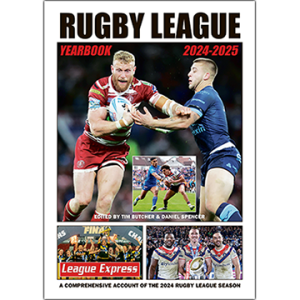
CHRIS HEINITZ is a Rugby League enthusiast, a Londoner who came north, fell in love with Yorkshire and Featherstone Rovers and has been living here now for 50 years. He has edited the Featherstone matchday programme and set up the fevnut’s blog.
THE demise of Cornwall is yet another hammer blow for Rugby League’s history of expansion by bringing in new clubs, particularly from outside the M62 corridor.
Other sports seem to manage the development of new clubs into the upper echelons of their structure far better than Rugby League has done. Two examples are Durham, in cricket, and Wycombe Wanderers in soccer.
I am by no means against the idea of expansion. We have a great sport and we would love to see it being played in many more locations at both professional and amateur levels.
At amateur level, expansion has been a success with well-established clubs and leagues in places that had no Rugby League presence not so long ago (Wests Warriors, Anglian Vipers and Bedford Tigers are good examples).
However, the story within the professional game has been lamentable, and always has been, but the proportion of newly created professional clubs that we have lost in the summer era is much worse than it has been since the end of the First World War.
Before we go any further, we need to make clear that there are some muddy waters caused by clubs changing names or moving locations, or in some cases both.
In 1895 they were all new Rugby League clubs and inevitably quite a lot were not able to withstand the rigours of becoming professional sports clubs. Of the clubs that contested that first season in 1895/96, five no longer exist. There are also seven clubs that joined between 1896 and 1899 that only lasted for a few years.
As we move into the early twentieth century there are 15 clubs who came into the Northern Rugby League between 1901 and 1910 who failed to make it to the end of World War 1 and seven of those only lasted one year!
After World War 1 it settled down quite well and in the next 20 years there were only six clubs that went out of existence, and, once again, three of those of those only lasted one season.
Between the end of World War 2 and the beginning of the ‘Summer Era’ in 1996 (a period of 50 years) professional Rugby League lost just six clubs and three of those were the result of ‘restructuring’ at the end of 1992-93 that saw them sacked from the professional game.
This is the list of the clubs who departed from professional Rugby League between 1895 and 1995 in order of the first season in which they competed.
Pre-1900 Clubs
Bradford (1895-1907), Brighouse Rangers (1895-1906 & 1915-1918), Broughton Rangers/Belle Vue Rangers (1895-1955), Liversedge (1895-1902), Manningham (1895-1903), Castleford (1896-1906), Holbeck (1896-1904), Leeds Parish Church (1896-1901), Morecambe (1896-1906), Radcliffe (1896-1902), Heckmondwike (1898-1902), Millom (1899-1906)
1900-World War 1
Altrincham (1901-1902), Goole (1901-1902), Lancaster (1901-05), Normanton (1901-06), South Shields (1901-04), Birkenhead Wanderers (1902-1903), Pontefract (1903-08), Liverpool City (1906-07), Ebbw Vale (1907-12), Merthyr Tydfil (1907-11), Aberdare (1908-09), Barry (1908-1909), Mid-Rhondda (1908-09), Coventry (1910-13), Runcorn (1910-18)
Between World War 1 and World War 2
St. Helens Recreation (1917-39), Pontypridd (1926-27), Carlisle City (1928-1929), Acton & Willesden (1935-36), Streatham & Mitcham (1935-37), Newcastle (1936-38)
Post World War 2 to 1996
Cardiff (1951-52), Blackpool Borough/Springfield Borough/Chorley Borough/Trafford Borough/Blackpool Gladiators (1954-1993), Cardiff City/Bridgend Blue Dragons (1981-85), Kent Invicta/Southend Invicta (1983-85), Mansfield Marksman/Nottingham City (1984-93), Scarborough Pirates (1991-92), Chorley Borough (1991-93)
On to the Summer Era which has seen decisions to bring in 20 new clubs, two of whom (Ottawa Aces and Bristol Bears) were accepted into League One but never actually managed to play at all! Of the other 18, only five are still playing professional Rugby League.
The ones we have lost since 1996 are: Chorley Chieftains/Lancashire Lynx/Chorley Lynx (1996-2004), Paris Saint Germain (1996-1997), South Wales (1996), Gateshead Thunder (1999), London Skolars (2003-2023), Blackpool Panthers (2004-2010), South Wales Scorpions/Ironmen (2010-2017), Gloucestershire All Golds (2013-2017), Hemel Stags (2013-2018), Oxford (2013-2017), Toronto Wolfpack (2017-2020), West Wales Raiders (2018-2022), Cornwall (2022-2025).
During the summer era we have also seen the demise of three longer established clubs.
Bramley 1896-1999, Wigan Highfield/London Highfield/Liverpool City/Huyton/Runcorn Highfield/Highfield/Prescot Panthers 1922-1997, Carlisle/Carlisle Border Raiders 1981-1997
Three new clubs (Gloucestershire All Golds, Hemel Stags and Oxford) came in together in 2013 and they have all gone.
The five remaining clubs are Catalans Dragons (now in their 20th season), Coventry Bears/Midlands Hurricanes (in their 11th season) and currently leading League One, newcomers Goole Vikings, Toulouse Olympique who joined in 2009 but went back to the French Elite competition from 2012 to 2015 before re-joining in 2016 and Celtic Crusaders/Crusaders RL/North Wales Crusaders who have had considerable problems since they began in 2006 but have managed to survive.
Wales has seen the worst history. There have been 12 clubs in all who have been created in the Principality but North Wales are the only ones who are still with us and six of the twelve only lasted for one season.
The record for London and the South-East is also very poor. Seven clubs were created, of which three lasted for only two seasons and one departed after just one season.
Time and time again we are told that creating a London and South East presence is of major importance and yet there was very little done to support those clubs. London Broncos, the sole survivors, came very close to extinction by virtue of their ludicrous treatment by RFL/IMG when they gained promotion to Super League, only for it to be made clear, however well they did, they would be kicked out after just one season.
In recent weeks there has been a growing clamour to kick out Catalans and Toulouse. Of course, they bring very few fans to English stadiums. But that is hardly surprising when their fans would have to pay for air fares and hotels every other week.
The situation in England, whereby many fans travel to away fixtures, is rare in world sport. Taking American Football as an example, you won’t get many Seattle Seahawks fans travelling to a match against Tampa Bay Buccaneers (the distance between them by road is over 3,000 miles) or Buffalo Bills to Los Angeles Rams (over 2,500 miles).
In Australia there are plans to incorporate a team from Perth into the NRL competition. A trip from North Queensland Cowboys to Perth would also cover over 3,000 miles each way.
English Rugby League clubs need to work much harder to attract local supporters and they should regard away supporters as a nice bonus.
There have been a few times I have managed to make the trip to watch games at Perpignan and Toulouse and doing so has proved to be a wonderful experience. There are thousands of English fans who feel the same way.
The problem with Catalans and Toulouse is not the lack of their fans coming to England, but rather the issue of broadcasting deals for them and that really does need to be sorted out.
So, why has expansion been such a failure?
I believe there have been two prime reasons. One is bringing in clubs without a sufficient supporter base, a reliable source of income and a pool of local talent to draw upon. The latter is backed up by the number of times new League One clubs have been beaten in the Challenge Cup by amateur clubs. The second, and most importantly, is the devastating stripping away of central funding for second and third-tier teams.
I believe that no more new teams should be brought into the RFL structure until there has been a full investigation into how to select and support new clubs in a such a way that would make it much more likely that they can survive and build. This should be included as part of the strategic review.
A succession of new clubs that fail does Rugby League no good whatsoever!




